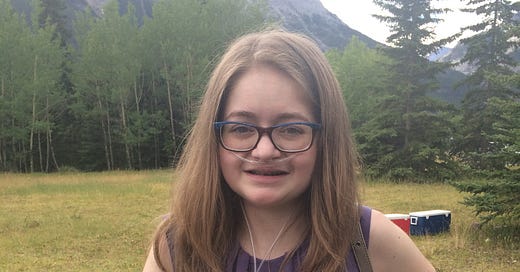Notes from a Kindred Spirit is a bi-weekly newsletter about embracing curiosity, exploring hobbies, living with chronic illness, and finding contentment in the everyday.
Trigger warning: Please note that this clip and the transcript below contain medical content, including a description of surgery.
Hi friends,
Today, I’m sharing an audio post as part of
’s Substack Sound Circle.Laura provided a prompt and invited anyone who wished to participate to record themselves sharing a response to the prompt “transitions.”
This was a bit of a vulnerable piece for me to write and record, but I enjoyed the process and I’d love to hear your feedback below.
If you’d prefer to read instead of listen, you can read the transcript below.
Transcript
I don’t think we realize how essential listening to our body is until that line of communication is broken.
Let me explain.
I have Cystic Fibrosis, or CF, an incurable genetic disease that affects mainly the lungs but many other parts of the body as well.
I was diagnosed as an infant, so I have never known a life without CF. Growing up, I was hospitalized many times and underwent various tests, procedures, and surgeries. I became very familiar with the healthcare system and began to figure out how to advocate for myself within it, even as a kid.
When you are constantly being questioned about your symptoms, you learn to pay very close attention to your body. I could tell when a lung infection was beginning. I knew when I needed to increase my inhaler usage. I noticed when my sinuses required more flushing. I could sense when a cough was something to worry about and when it wasn’t.
By the time I was 23, my lungs had deteriorated so much that I required supplemental oxygen 24/7. I had very little energy, and my “quality of life,” as the healthcare system calls it, was not very high. So, in late 2016, I received a double lung transplant. This is not a cure for CF, as it is a whole-body disease, but thanks to my donor, I now have relatively healthy lungs that I’m incredibly grateful for.
The transplant was an extremely scary process for me, but I was so hopeful about what it would mean for my quality of life to be able to breathe freely again. What I did not anticipate were the difficult aspects of the transition from living in a body with CF lungs to living in a body with someone else’s lungs.
During the surgery and recovery period, I lost something very important. My connection to, and understanding of, my body. I lost the ability to interpret my symptoms and how I felt physically day to day. My body was foreign to me. 23 years of knowledge - lost. I felt out of control. That knowledge had been a safety net. I could rely on it to guide me in my healthcare decisions, and suddenly the net had been taken away. What were all of these new symptoms? What did they mean? For the first time in many years, I had to rely more heavily on the doctors to interpret symptoms and guide my care. I was not ready to give up that bit of control when living with a chronic illness meant that I had such little control to begin with.
A lung transplant is not a minor surgery. My ribcage had been opened up, and my lungs removed. Someone else’s lungs had been put inside me and connected to my airways. My ribs had been put back in place and were now held together by wire. I had a tracheostomy where a hole was cut into my neck. I had an IV in my neck and one in my hand. The sensations I felt when I touched the skin on my chest had changed. Nerves had been damaged during the surgery. Was this my body anymore? Whose body was this?
I was not prepared for this transition. So much of the focus leading up to the transplant was on how much easier I’d be able to breathe afterwards and how much better I’d feel overall. It was going to save my life. That was an important and necessary focus that helped me get through the weeks of waiting for a pair of lungs that would be a match. But, the transition from knowing my body to not, and the fear that created was extremely difficult to experience. I wish I would have had more preparation beforehand. There were so many emotionally challenging aspects of recovery, but feeling like I no longer knew my body was one of the hardest parts of the transition to life post-transplant.
Now, 7 years later, I’m in the midst of another transition. I’m slowly rebuilding the line of communication with my body. I’m re-learning what various symptoms could mean with these new lungs, and I understand the side effects of medications I have to take to prevent my body from rejecting them. But I’m also finding new ways to ground into my body. I now live somewhere with milder weather where I can spend more time outside. Going for walks and breathing in the mountain and sea air brings back a sense of connection to my body and what it can do. Morning stretches and sitting out on my balcony in the sun are other ways that help me reconnect.
So, consider this my gentle invitation to you to tune into your body more often. Find activities or practices that help you connect and feel grounded in your body. I’d love to hear what you discover.
Did this piece resonate with you? How do you tune into your body?
If you know someone who might connect with my story, I’d love if you’d share this piece with them.











Share this post